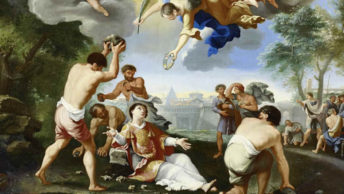The recent liturgical memorial of St Clare was a great blessing for me. Besides the holy life this great follower of St Francis’ ideal lived, an ideal which still inspires and appeals to us today after eight centuries, this liturgical memorial was graced by a powerful pericope taken from the Second Letter of St Paul to the Corinthians, precisely 2 Cor 4:6-10, 16-18.
The more the Lord gave me the grace to delve deeper into this reading the more He helped me realize the great potential this reading has for us, who are living in today’s society. When one reads it with an open heart and mind, this reading has much to say to the way we are conducting our lives. To begin with, today there is the tendency toward a lack of hope. Many are left with the sour illusions our post-modern culture has promised. Its vain promises of wealth and unbridled freedom of every sort is making us aware of how, in fact, we are not free and wealthy at all. As we can see the rich are becoming richer and the poor are becoming poorer.
Such an air of distrust, which is leading one towards a more tragic isolation, is portraying that pessimism, that darkness of the soul which the papal preacher, Cardinal Raniero Cantalamessa OFM Cap, rightly spoke about at the Good Friday liturgy of the Passion of the Lord at St. Peter’s Basilica, when he reflected on the Death and Resurrection of the Lord in our secularized societies on 7 April 2023. He said that although it is not up to us to judge the German philosopher who had his share of suffering in his life and whose heart only God knows, continued Cardinal Cantalamessa, we can and must judge the effects that his thought has had in our world, and whose common denominator is a total relativism in every field – ethics, language, philosophy, art, and, of course, religion. Cardinal Cantalamessa said: Nothing more is solid; everything is liquid, or even vaporous. At the time of Romanticism, people used to bask in melancholy, today in nihilism!
In this total chaos of every kind resounds the hope Pope Francis gives us during his homily imparted on Tuesday, 19 March 2013, the Solemnity of Saint Joseph, at the Mass, imposition of the pallium and bestowal of the fisherman’s ring for the beginning of the Petrine Ministry of the Bishop of Rome in Saint Peter’s Square:
Today too, amid so much darkness, we need to see the light of hope and to be men and women who bring hope to others. To protect creation, to protect every man and every woman, to look upon them with tenderness and love, is to open up a horizon of hope; it is to let a shaft of light break through the heavy clouds; it is to bring the warmth of hope!
The Pope’s ardent appeal is the same one I read at Mass from the Second Letter to the Corinthians when the Apostle of the Gentiles said: For it is God who said, “Let light shine out of darkness,” who has shone in our hearts to give the light of the knowledge of the glory of God in the face of Christ (2 Cor 4:6).
The face of Christ, fully impregnated with God’s glory that is light, is the definite answer of the light that shines in the darkness, as, after all, the Gospel of John itself tells us: In him was life, and the life was the light of men. The light shines in the darkness, and the darkness has not overcome it (John 1:4-5). Hence, you and me, as Christians, are the witnesses of this light which never goes away and vanishes from amongst us. That is why Cardinal Cantalamessa OFM Cap said that we, as believers, are duty-bound to illustrate what is behind Nietzsche’s proclamation of ‘the Death of God’: that is man’s denial of the Lord’s infinite Love described symbolically in the Genesis account of Creation, which He confirmed by humbling Himself into a Man and becoming obedient to the point of death, even death on a cross (Phil. 2:8).
It is Christ’s humiliating death on the Cross which is our invincible power to keep us moving on amid our sufferings and difficulties, we who have been invested with this treasure in earthen vessels (2 Cor 4:7). Thus, St Paul writes: But we have this treasure in earthen vessels, to show that the transcendent power belongs to God and not to us. We are afflicted in every way, but not crushed; perplexed, but not driven to despair; persecuted, but not forsaken; struck down, but not destroyed; always carrying in the body the death of Jesus, so that the life of Jesus may also be manifested in our bodies (2 Cor 4:7-10).
Saint Paul in his letter to the Corinthians encourages us to keep remembering the fact that we are not to lose heart (2 Cor 4:16). The reason being that real development is occurring in and through us thanks to the hidden work of grace, which comes from above. That grace which is with God and leads us to Him to dwell in His the majesty of His Presence for eternity. The Apostle tells us: Though our outer nature is wasting away, our inner nature is being renewed every day. For this slight momentary affliction is preparing for us an eternal weight of glory beyond all comparison, because we look not to the things that are seen but to the things that are unseen; for the things that are seen are transient, but the things that are unseen are eternal (2 Cor 4:16-18).
The temptation is clear: giving head to the prophets of doom. Pope Francis’ apostolic exhortation, Evangelii Gaudium (The Joy of the Gospel), makes this clear when it asserts: One of the more serious temptations which stifles boldness and zeal is a defeatism which turns us into querulous and disillusioned pessimists, “sourpusses” (no.85). However, let us resort to that breathtaking address for the Opening of the Second Vatican Council (11 October 1962) which Pope Saint John XXIII delivered:
At times we have to listen, much to our regret, to the voices of people who, though burning with zeal, lack a sense of discretion and measure. In this modern age they can see nothing but prevarication and ruin … We feel that we must disagree with those prophets of doom who are always forecasting disaster, as though the end of the world were at hand. In our times, divine Providence is leading us to a new order of human relations which, by human effort and even beyond all expectations, are directed to the fulfilment of God’s superior and inscrutable designs, in which everything, even human setbacks, leads to the greater good of the Church (4.2).
God’s ways are beautifully surprising indeed! That is why we do not lose heart (2 Cor 4:16)! This is, in a nutshell, the immense spiritual witness God has endowed me with thanks to the second reading from Saint Clare’s memorial mass on Friday August 11, 2023.








